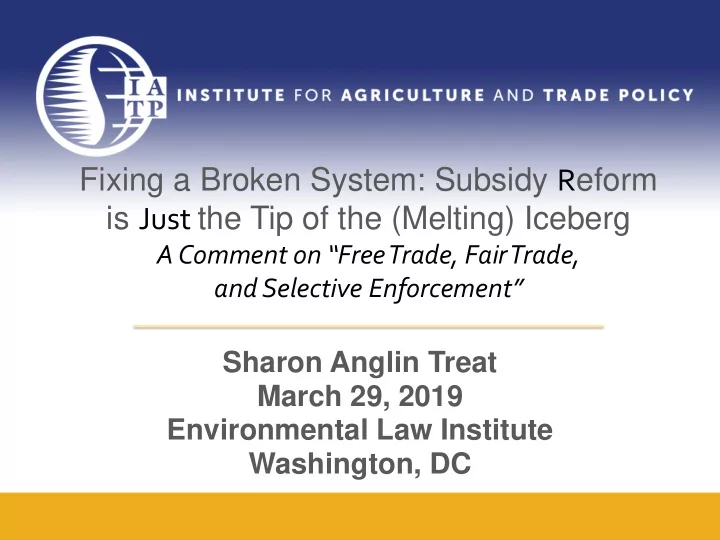

Fixing a Broken System: Subsidy R eform is Just the Tip of the (Melting) Iceberg A Comment on “Free Trade, Fair Trade, and Selective Enforcement” Sharon Anglin Treat March 29, 2019 Environmental Law Institute Washington, DC
• Meyer is right: Subsidies are speeding up climate change and depleting marine fisheries • Governments pledged to address both – without doing so, either within WTO (selective enforcement) or outside • The bigger picture: Special rights for oil, gas, and coal • Defining sustainability: Industrial-scale biofuel production and intensive aquaculture are part of the problem • Should the WTO have new powers to address this? If not, what’s the alternative? 2
Governments Pledge Reform • 2009 – G20 govts pledge to rationalize and phase out “inefficient” fossil fuel subsidies that encourage “wasteful consumption” • APEC soon follows suit • 2015 - Paris Climate Agreement • 2016 – G7 counties (67% of fiscal support for FFS) agree to phase out subsidies by 2025 • UN sustainable development goal signed by 193 nations: End subsidies contributing to illegal/overfishing by 2020 3
Natural Resources Defense Fund, G7 Fossil Fuel Subsidy Scorecard June 2018 4
It’s more than a subsidy problem 5
Investor Privileges • Half of all investor-state dispute (ISDS) cases registered at the World Bank in 2015 related to oil, mining, gas, electric power or other energy forms • While purportedly reforming ISDS, the new NAFTA (USMCA) continues to apply old rules to oil & gas concessions in Mexico; an energy side letter guarantees pipeline access between US & Canada • CETA and CPTPP – signed after Paris accord – keep ISDS with minor changes, include restrictions on local procurement content, and limit controls over fuel extraction and pipeline development 6
“One Treaty to Rule Them All” Corporate Europe Observatory 7
Money makes the world go ‘round 8
Influence Map 9
OpenSecrets.Org 10
USTR Website 11
Defining Sustainability 12
Picture page Transport & Environment 13
14
GreenPeace 15
16
17
18
How Best to Reform 19
Is the WTO the answer? Moving the focus of international negotiation on intellectual property into the trade sphere- from the UN’s World Intellectual Property Organization to the WTO- “was a brilliant strategic move for business. It ensured that commercial considerations would dominate and outweigh other goals, such as implications for economic development and public health.” – Dani Rodrik, What Do Trade Agreements Really Do? Journal of Economic Perspectives (2018) 20
Lessons from the EGA • The Environmental Goods and Services Agreement being negotiated by WTO members, which aims to reduce or eliminate tariffs on “environmentally beneficial” products and services, is a real world example of environmental decision-making going awry when the overarching framework is trade liberalization. • The EGA could be part of the solution to the problem of WTO subsidy challenges that increase the cost of renewable energy. • Instead, its more about reducing tariffs than promoting environmental sustainability. Among the products considered environmentally beneficial are polluting chemical and toxic waste incinerators. 21
Lessons from fisheries negotiations? • CPTPP Article 20.16 prohibits subsidies negatively impacting overfished fisheries or benefiting illegal, unreported and unregulated fishing, and subsidies that contribute to overfishing or excess capacity to fish. • Banned subsidies narrowly defined in USMCA; text sets 3-year deadline for compliance. • Meaningful? Enforcement largely unchanged from ineffective mechanisms of prior FTAs. • Outcome of years of (otherwise inconclusive) multilateral WTO negotiations to end fishing subsidies by 2020? 22
What’s the alternative to WTO as prosecutor? • Data-gathering: currently no database of fossil fuel subsidies or even agreement on definitions • ILO example- labor rights standards developed outside of WTO, and incorporated into trade agreements where, if enforcement mechanism (and political will) are strong enough, potential to achieve reforms. • WTO as convener? • International public health and environmental accords (Paris Climate Accord; WHO Convention on Tobacco Control) must have precedence over WTO trade rules 23
Thank You! CONTACT INFO: Sharon Anglin Treat Senior Attorney Institute for Agriculture & Trade Policy Email: streat@iatp.org Website: www.iatp.org Twitter: @sharontreat @IATP 24
Recommend
More recommend